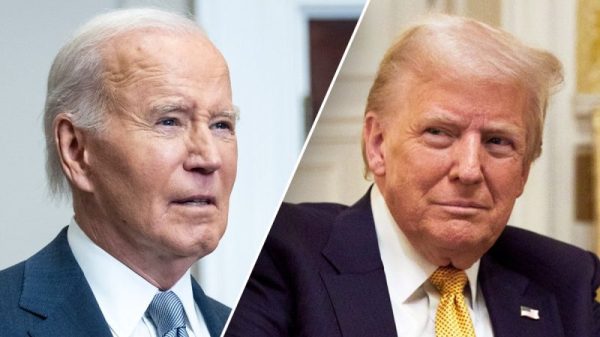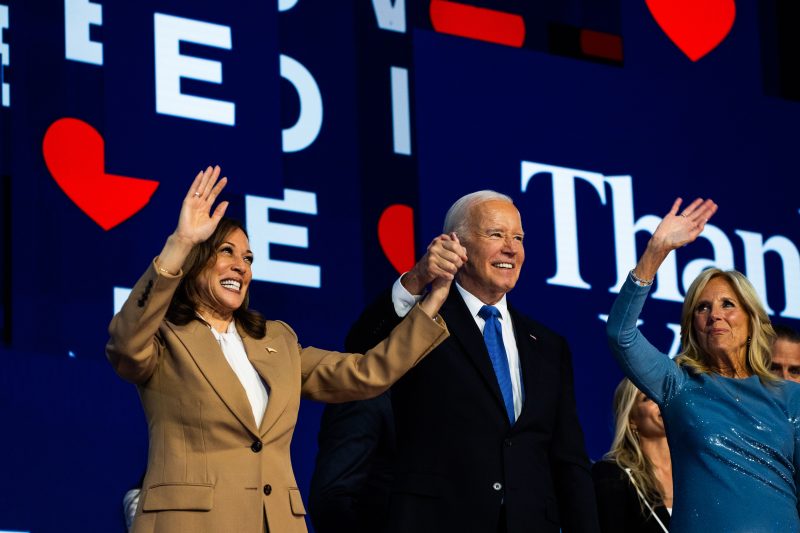A new Trump campaign ad this week has gone semi-viral in right-wing social media circles. The ad splices together clips of Vice President Kamala Harris citing the high costs of inflation at an event this month with her past comments extolling the virtues of “Bidenomics.”
“The debate we’ve all been waiting for,” the text on the screen reads, “Harris vs. Harris.”
The Trump campaign has started running a new ad in Arizona focused on inflation and using Harris’ past support for the WH’s ‘Bidenomics’ push, per @AdImpact_Pol pic.twitter.com/wb2rIo05OU
— Alex Thompson (@AlexThomp) August 26, 2024
The ad highlights something Republicans have been apoplectic about: how President Joe Biden’s unpopularity hasn’t seemed to weigh down Harris thus far.
She is, after all, his second-in-command. Doesn’t she also own the outcomes — on the border, on the chaotic 2021 Afghanistan withdrawal and yes, on inflation — that Americans have been so unsatisfied with?
The answer appears to be: Perhaps less than you might think — and certainly less than Republicans hope.
Whether she will maintain that distance between Biden’s liabilities and her candidacy remains to be seen; this is clearly going to be a battleground. But it’s worth drilling down on just how much voters actually do and could connect Harris to those outcomes.
Thus far, polling shows that Harris is performing better than Biden ever did in the 2024 cycle and appears a slight favorite to win the presidency. Her image ratings have improved significantly in recent weeks, making her more popular than both Biden and Donald Trump.
I noted this month that Harris also does better than Biden when you drill down on specific issues. She has significantly closed the gap on what have long appeared to be Democrats’ biggest issue liabilities: the economy and immigration.
It’s possible that’s a temporary sugar high owing to the sudden enthusiasm for having a non-Biden and non-Trump candidate in the race. But there is also reason to believe that she might not suffer too much from being tied to Biden’s policies.
A Washington Post-ABC News-Ipsos poll this month got at this dichotomy in a really interesting and instructive way. It asked Americans how much influence they thought Harris had on the Biden administration’s economic and immigration policies. (On the latter issue, Republicans have sought to label Harris as Biden’s “border czar,” even though her role was more limited than that suggests.)
It turns out they don’t think Harris as vice president played a particularly central role.
On the economy, 64 percent of Americans said Harris had “just some” or “very little” influence within the administration, compared with 33 percent who said she had a “good amount” or a “great deal.”
It was closer on immigration, an area in which Harris took more of a high-profile role. But still Americans said 57-39 that she had only “some” influence or less.
And very few Americans believe she had a “great deal” of influence — just 11 percent on the economy and 15 percent on immigration.
What’s also interesting in these numbers is how the partisans break down. Republicans were actually less likely to say she had at least a “good amount” of influence than Democrats — despite their party trying to attach her to Biden on these issues. Perhaps some of that owes to them viewing her as generally incompetent.
But the group least likely to see her as influential? Independent voters. Fully 70 percent of them said she had relatively little influence on the administration’s economic policies, while 62 percent said she had relatively little influence on immigration.
Only 8 percent of independents said she had a “great deal” of influence on the economy, and only 13 percent said she had a great deal of influence on immigration.
There’s a real question in these numbers about precisely why Americans don’t think she has been more influential. Is it because they didn’t see her much until recently? Is it because they think she’s not particularly strong on policy? Or is it because they think the vice presidency just isn’t that instrumental?
The vice president, after all, has only a couple of major constitutionally defined roles: succeeding the president if need be and casting tiebreaking votes in the Senate.
But regardless, you begin to see how voters might look at Harris and believe that she might be better and even something of a “change” candidate. For now, that’s what they’re doing.


































